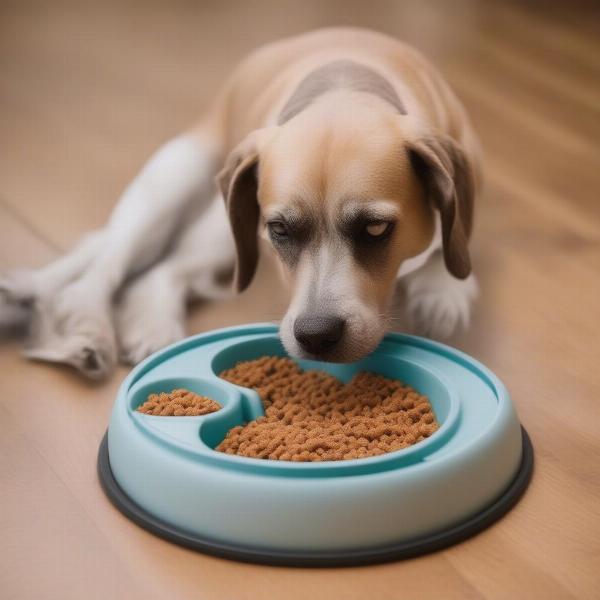Bloat, also known as Gastric Dilatation-Volvulus (GDV), is a life-threatening condition in dogs. It occurs when the stomach fills with gas and/or fluid and then twists, cutting off blood supply to vital organs. Knowing the signs, risk factors, and preventative measures can be the difference between life and death for your beloved canine companion. This article will equip you with the knowledge to become a bloat buster dog advocate.
Recognizing the Signs of Bloat in Your Dog
Bloat can progress rapidly, so recognizing the early signs is crucial. Symptoms include a distended, painful abdomen, excessive drooling, unsuccessful attempts to vomit, restlessness, pacing, rapid breathing, and weakness. If you suspect your dog is experiencing bloat, seek immediate veterinary attention. Every minute counts.
Risk Factors: Which Dogs Are Most Susceptible?
While any dog can develop bloat, certain factors increase the risk. Large, deep-chested breeds like Great Danes, German Shepherds, and Standard Poodles are particularly susceptible. bloat buster for dogs Other risk factors include eating rapidly, consuming large meals once a day, elevated food bowls, stress, and a family history of bloat. Understanding these factors can help you implement preventative strategies.
Prevention is the Best Medicine: Proactive Steps for a Bloat Buster Dog
Several proactive measures can significantly reduce the risk of bloat. Feeding smaller, more frequent meals can prevent the stomach from overfilling. Slow feeders or puzzle toys can encourage slower eating habits. poodle stud dogs Avoid strenuous exercise immediately before or after meals. Providing fresh water at all times is also essential. Finally, discuss preventative gastropexy surgery with your veterinarian, especially if your dog is a high-risk breed.
 Dog Using a Slow Feeder
Dog Using a Slow Feeder
Elevated Food Bowls: Helpful or Harmful?
The debate continues regarding elevated food bowls and their connection to bloat. Some studies suggest a correlation between elevated bowls and an increased risk of GDV, particularly in large, deep-chested breeds. Consult with your veterinarian to determine the best feeding practices for your individual dog.
What to Do in a Bloat Emergency
If your dog exhibits signs of bloat, act quickly! Immediate veterinary care is crucial. Do not attempt to induce vomiting or administer any medications without veterinary guidance. Transport your dog to the nearest emergency veterinary clinic as quickly and safely as possible.
Bloat Buster Dog: A Lifelong Commitment
Protecting your dog from bloat is an ongoing commitment. By understanding the risks, recognizing the signs, and implementing preventative strategies, you can significantly reduce the likelihood of this devastating condition. Be a proactive bloat buster dog advocate and ensure your furry friend lives a long, healthy, and happy life. best dog food for standard poodles
Conclusion
Bloat is a serious and potentially fatal condition, but with the right knowledge and proactive measures, you can help protect your beloved canine companion. Remember, early recognition and swift veterinary intervention are critical. Be a responsible pet owner and become a bloat buster dog hero. where can i get activated charcoal for dogs
FAQ
- What is the first sign of bloat in a dog? Often, a swollen, hard, and painful abdomen is one of the earliest noticeable signs.
- Can bloat be treated at home? No, bloat requires immediate veterinary intervention.
- Is preventative gastropexy surgery effective? Gastropexy is highly effective in preventing GDV.
- What should I feed my dog to prevent bloat? Smaller, more frequent meals and avoiding elevated food bowls are recommended.
- Are certain breeds more prone to bloat? Large, deep-chested breeds are at higher risk.
- Can stress contribute to bloat? Yes, stress can be a contributing factor.
- What is the prognosis for a dog with bloat? With prompt treatment, the prognosis can be good, but early intervention is key.
ILM Dog is your trusted resource for expert advice on all aspects of dog care, from breed selection to health and nutrition. We offer a wealth of information to help you navigate the joys and challenges of dog ownership. Whether you’re a seasoned dog owner or just starting your journey, we’re here to support you. Contact us today for personalized guidance on everything dog-related. Email: [email protected] Phone: +44 20-3965-8624 Visit ILM Dog for more helpful tips and resources.